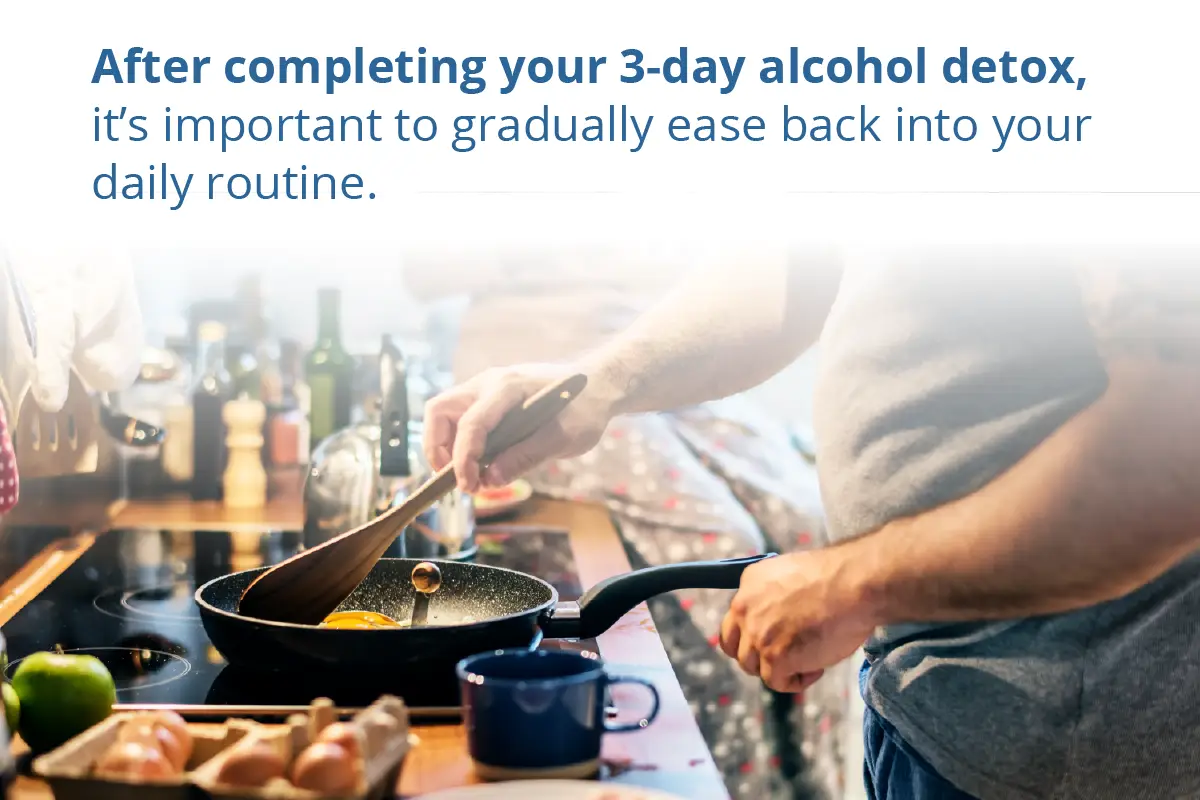The Ultimate Guide To A 3-Day Alcohol Detox
Other Categories

Introduction To 3-Day Alcohol Detox
A 3-day alcohol detox is a short-term program designed to help individuals stop drinking alcohol and begin recovery. Over three days, participants undergo a process to clear alcohol from their system and manage harmful withdrawal symptoms. It can be done at home or in a detox facility, depending on the individual’s needs and severity of alcohol consumption.
Many people consider a 3-day alcohol detoxification to kick-start their recovery from alcohol abuse and addiction — a critical step given how common alcohol-related struggles are in the U.S. Today, drug addiciton stats show that millions nationwide are affected, making detox programs an important resource for those ready to make a change. For many, a short-term detox offers a manageable way to reduce alcohol intake without the intensity of longer programs, making it a popular option for those new to recovery or balancing busy schedules.
The potential benefits of 3-day alcohol detox programs include improved physical health, such as better sleep and increased energy levels. It can also improve mental clarity and lessen alcohol cravings. In addition, this type of detox can provide a sense of accomplishment and motivation to continue with further substance abuse treatment or lifestyle changes.
Key Takeaways
A 3-day alcohol detox is a short-term plan to help remove alcohol from your system and start addiction recovery. Here is what you need to know:
- Before detox, consult a healthcare professional, understand the detox process, and gather the necessary supplies to ensure a smooth start.
- During detox, follow a structured plan over three days to manage symptoms, stay hydrated, and reflect on your progress.
- After detox, gradually reintroduce daily routines, seek ongoing support, and make long-term lifestyle changes to sustain recovery.
Preparation For A 3-Day Alcohol Detox
Starting a 3-day alcohol detox requires careful preparation to ensure a smooth and effective experience. Here’s how to prepare for this detox process effectively.
Consulting A Healthcare Professional
Before starting a 3-day alcohol detox, it’s essential to consult an addiction treatment professional. They can assess your overall health, discuss potential risks, and provide guidance on how to manage alcohol withdrawal safely.Understanding The Detox Process
Next, understanding the detoxification process helps you know what to expect. During the detox, your body will begin to eliminate alcohol, and you may experience withdrawal symptoms like headaches, nausea, or mood swings.Gathering Necessary Supplies
Lastly, gathering the necessary supplies can make the detox process easier. Stock up on water, healthy snacks, and any over-the-counter medications recommended by your doctor. Having these supplies ready ensures you’re prepared.Navigating the First 3 Days of Detox
Adjusting to Detox
On the first day of your detox, you might experience a mix of physical and mental changes. Common symptoms include headaches, nausea, and fatigue. These are normal reactions as your body starts to adjust to the absence of alcohol. Remember to stay positive and keep focused on your goal.
Recommended Activities
To ease the alcohol detox process, keep yourself busy with gentle activities. Light exercise, like walking or stretching, can help improve your mood and energy levels. Try to engage in relaxing activities such as reading or listening to soothing music to keep yourself calm and distracted.
Dietary Guidelines
Eating a balanced diet is crucial during detox. Focus on consuming whole foods like fresh fruits, vegetables, and lean proteins. Avoid sugary and processed foods, as they can make alcohol withdrawal symptoms worse. Drinking plenty of water will also help flush out toxins from your system.
Physical And Emotional Changes
By the second day of alcohol detox, you might notice more pronounced symptoms, such as mood swings or anxiety. These changes are part of the detox process as your body continues to adapt. It’s important to acknowledge these feelings and remind yourself that they will pass.
Staying Hydrated
Hydration is vital to managing alcohol detox symptoms. Drink water throughout the day to help reduce headaches and fatigue. Herbal teas can also be soothing and help with relaxation. Refrain from caffeine and alcoholic drinks, as they can worsen dehydration and withdrawal symptoms.
Coping With Cravings
Cravings for alcohol can be strong on the second day of detox. Distract yourself with hobbies or call a supportive friend to talk. Deep breathing exercises and mindfulness meditation can aid in managing the urge to drink. Remember, cravings are temporary and will diminish over time.
Signs Of Progress
On the final day of your detox, you may start to feel more like yourself. Symptoms should be less intense, and you might notice improvements in mood and energy levels. Celebrate these positive changes, as they are indicators that your body is healing and adjusting well.
Maintaining Motivation
Keep yourself motivated by focusing on the benefits of completing the detox. Remind yourself of your goals and the positive changes you’re experiencing. Writing down your reasons for starting the detox can help strengthen your commitment and keep you focused on your recovery.
Reflecting On The Journey
On day 3, take time to reflect on your detox journey. Consider what you’ve learned about yourself and the process. Acknowledge your efforts and think about your next steps. Use this reflection to build a plan for continuing your recovery and maintaining a healthier lifestyle.
Gradual Reintroduction To Daily Routine
After completing your 3-day alcohol detox, it’s important to gradually ease back into your daily routine. Start by reintroducing regular activities slowly, without overwhelming yourself. Focus on maintaining a balanced schedule that includes time for rest, work, and leisure. This gradual approach assists your body in adjusting to its new, alcohol-free state and supports your overall well-being.
Importance Of Ongoing Support
Ongoing support is crucial for maintaining your progress after detox. Connect with local support groups like Alcoholics Anonymous (AA), counselors, or therapists who can provide guidance and encouragement. Sharing your experiences with others who understand can be very helpful. Regular check-ins with a healthcare professional can also ensure you stay on track and address any challenges you might face.
Long-Term Lifestyle Changes
To build on the success of your detox, consider making long-term lifestyle changes. Focus on healthy habits like eating nutritious foods, exercising regularly, and managing stress effectively. Avoid places or situations that may trigger cravings or temptations. By incorporating these positive changes into your daily life, you set a strong foundation for long-term recovery and improved health.
By following these post-detox recommendations, you set yourself up for continued success and continue moving toward a happier, healthier, alcohol-free life.
Who Is Not The Right Candidate For 3 Day Alcohol Detox
A 3-day alcohol detox program may not be suitable for everyone. Let’s identify who should consider other detox methods to ensure safety and effectiveness:
- Those With Severe Alcohol Dependence: Individuals with severe alcohol dependence might need more than a 3-day detox. Severe cases often require longer and more intensive treatment to manage severe withdrawal symptoms safely. An addiction treatment professional can help determine the appropriate level of care needed.
- Those With Co-Occurring Medical Conditions: People with existing medical conditions should approach detox with caution. Conditions like heart disease, liver problems, and diabetes can complicate the detox process. It’s essential to consult with a professional to determine the best approach for your unique needs.
- Those with Mental Health Issues: If you are struggling with mental health conditions like depression or anxiety, a 3-day detox may not be enough to address these concerns. Alcohol detox can impact your mood and mental state, so it’s crucial to have a comprehensive treatment plan that includes mental health support.
- Pregnant Or Breastfeeding Women: Pregnant or breastfeeding women should not undertake a 3-day alcohol detox on their own. The health of both the mother and baby is a priority, and detoxing from alcohol can pose risks. Professional medical advice is essential to ensure safety and appropriate care.
- Individuals Taking Certain Medications: If you are taking specific medications, a 3-day alcohol detox might not be suitable. Some prescription drugs can interact negatively with detox processes. Always consult with a healthcare provider to understand how detox might affect your current medications and overall health.
- People With Limited Support Systems: A strong support system is crucial during detox. If you have limited support from friends, family, or medical professionals, a 3-day detox might be challenging. It’s important to have people around who can offer emotional and practical support throughout the detox process.
By understanding these limitations, you can make a well-informed decision and ensure a safer and more effective alcohol detoxification experience.
Get Your Questions Answered
Navigating the journey to recovery can bring up many questions. Below are some of the most commonly asked questions about our services. If you need more information or have additional questions, we are only a phone call away.
What happens on day 3 of detox?
On day 3 of detox, withdrawal symptoms often peak, causing increased discomfort. You might experience intense cravings, fatigue, headaches, or mood swings. Your body is working hard to rid itself of toxins, which can make you feel unwell. It’s crucial to stay hydrated, eat nutritious foods, and get plenty of rest. Support from healthcare professionals and loved ones can help manage symptoms and keep you motivated. Remember, this challenging phase is a sign of progress towards recovery.
What does life look like after rehab?
After rehab, life can be both hopeful and challenging. You’ll start rebuilding daily routines, focusing on maintaining sobriety and managing triggers. Support from behavioral therapy, support groups, and loved ones is vital for ongoing recovery. It’s essential to set realistic goals, stay active, and develop healthy habits. Relationships and work life might need adjustment, but with perseverance and support, you can lead a fulfilling and balanced life. Embrace this new chapter with patience and a positive outlook.
Are there any risks or side effects associated with a short-term alcohol detox?
Short-term alcohol detox can have risks and side effects, including anxiety, irritability, headaches, and insomnia. In some cases, withdrawal symptoms like anxiety, sweating, nausea, or tremors may occur. For heavy drinkers, there’s a risk of more severe complications like delirium tremens or seizures. It’s essential to detox under medical supervision to manage these risks safely and effectively. Professionals can provide support and medication to ease symptoms and ensure a smoother detox process.


Does Niacin Help with Alcohol Detox? Benefits and Recovery Tips Certain vital nutrients are known

Lamotrigine, also known by the brand name Lamictal, is a medication for epilepsy that also

Introduction To 3-Day Alcohol Detox A 3-day alcohol detox is a short-term program designed to

The Role of Saunas in Alcohol Detox: Benefits, Risks, and Recovery Support Saunas are effective

If you’re wondering how long alcohol stays in your system, it’s helpful to understand the

Whether prompted by health concerns, personal growth, or the pursuit of a sober life, the
Have Questions? Let’s Talk!
24/7 Support
No Commitment
Ask questions, get guidance—no pressure, no obligation.
100% Private


